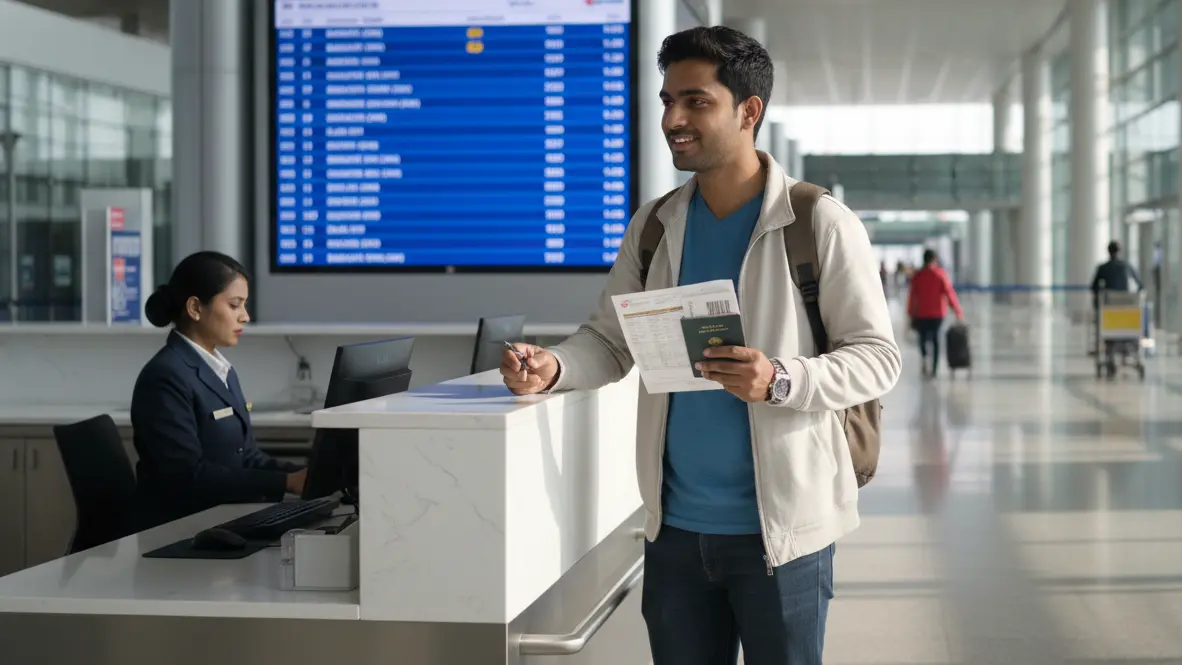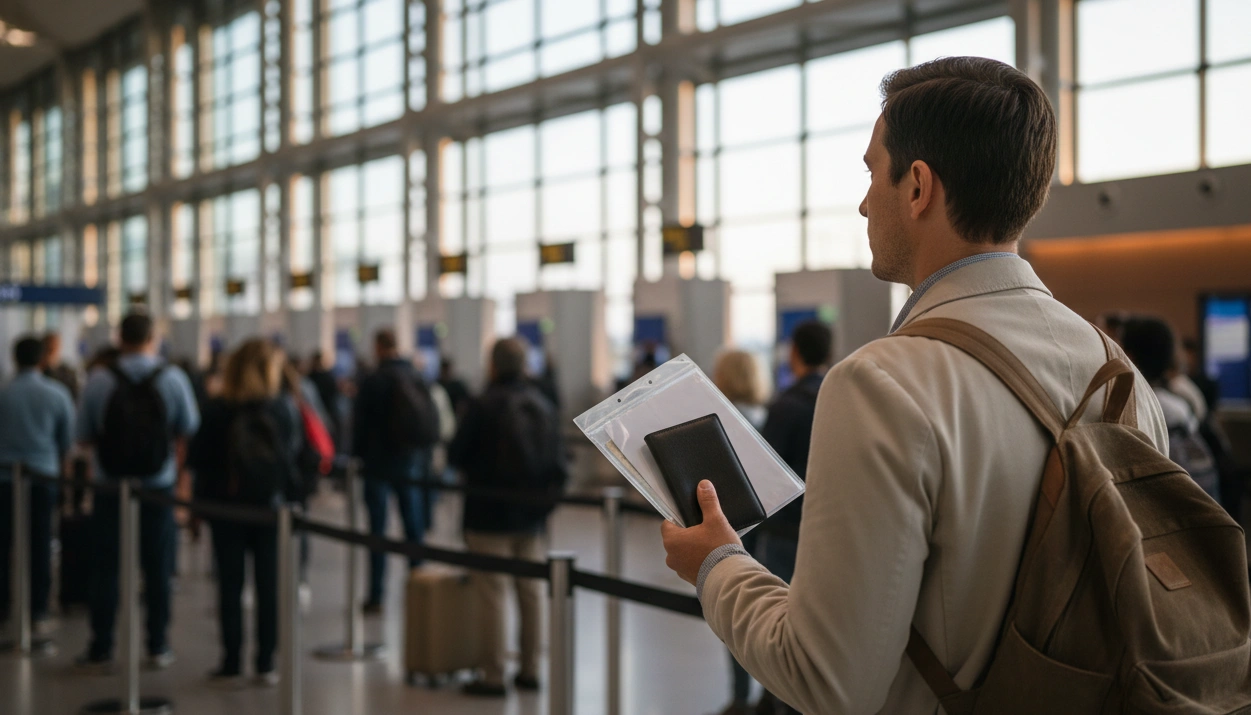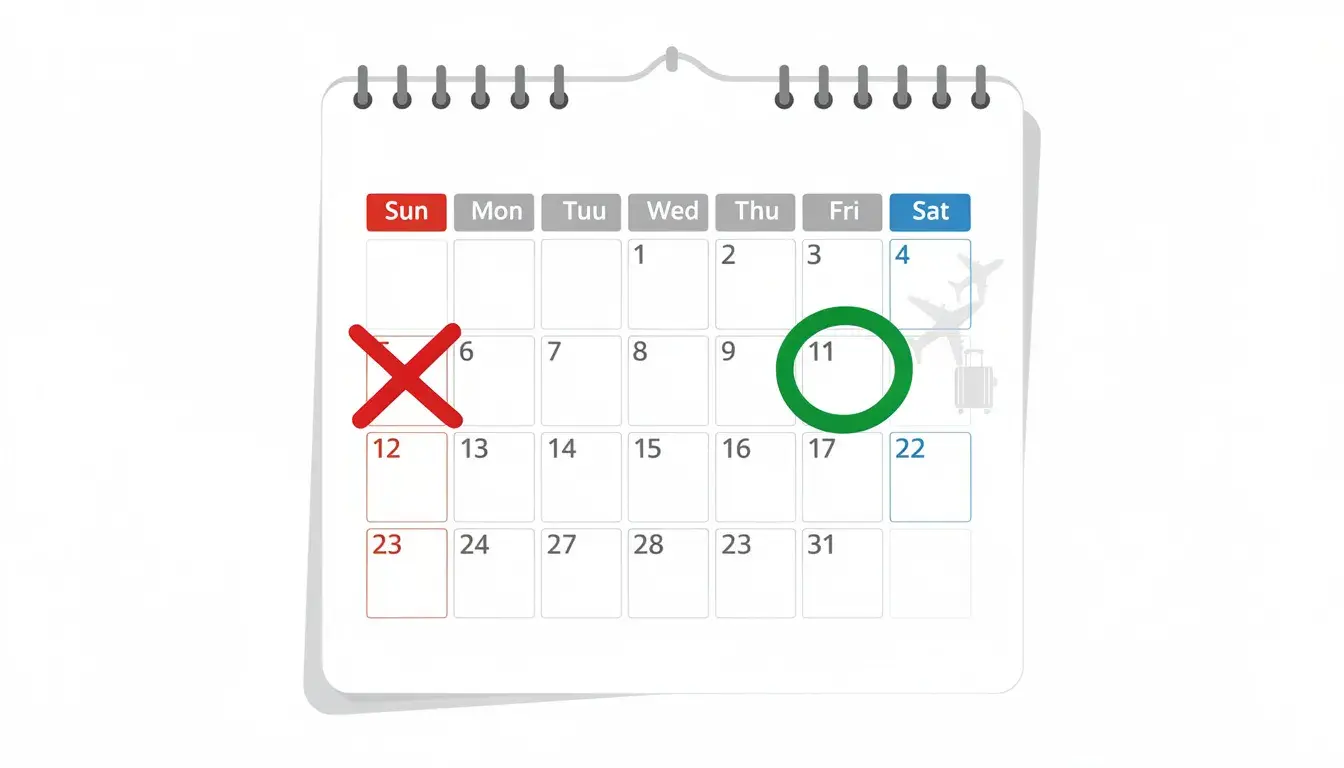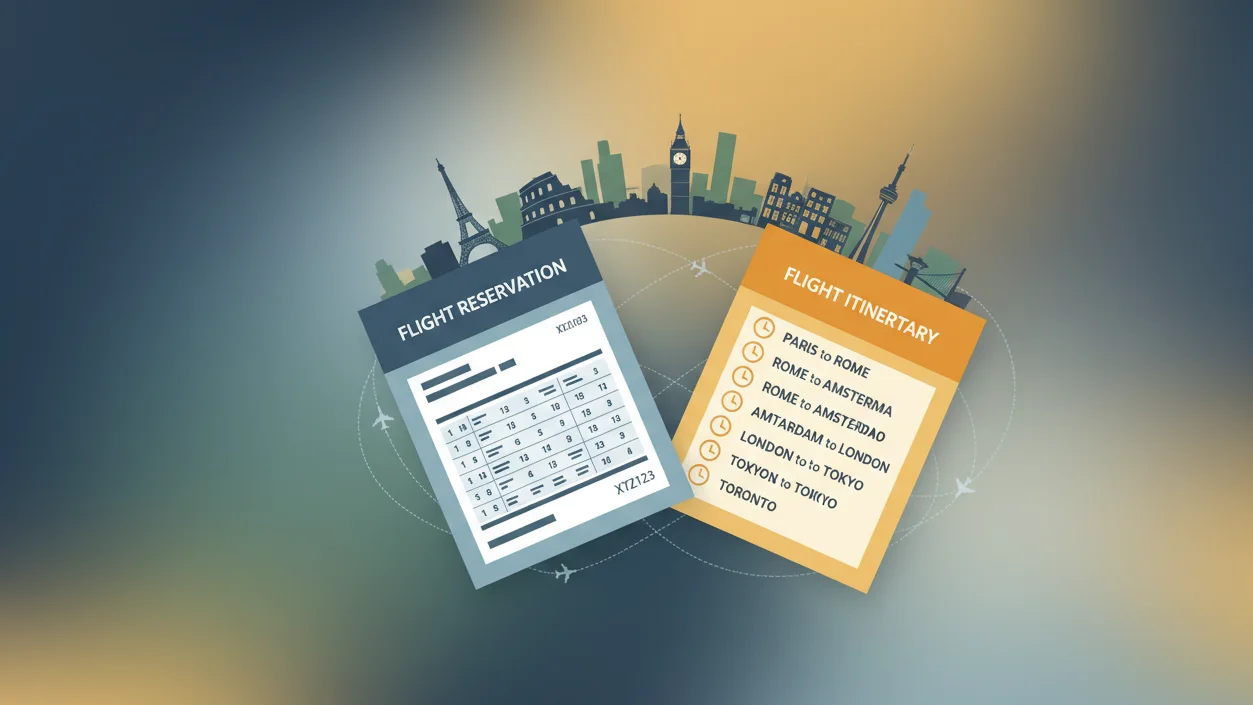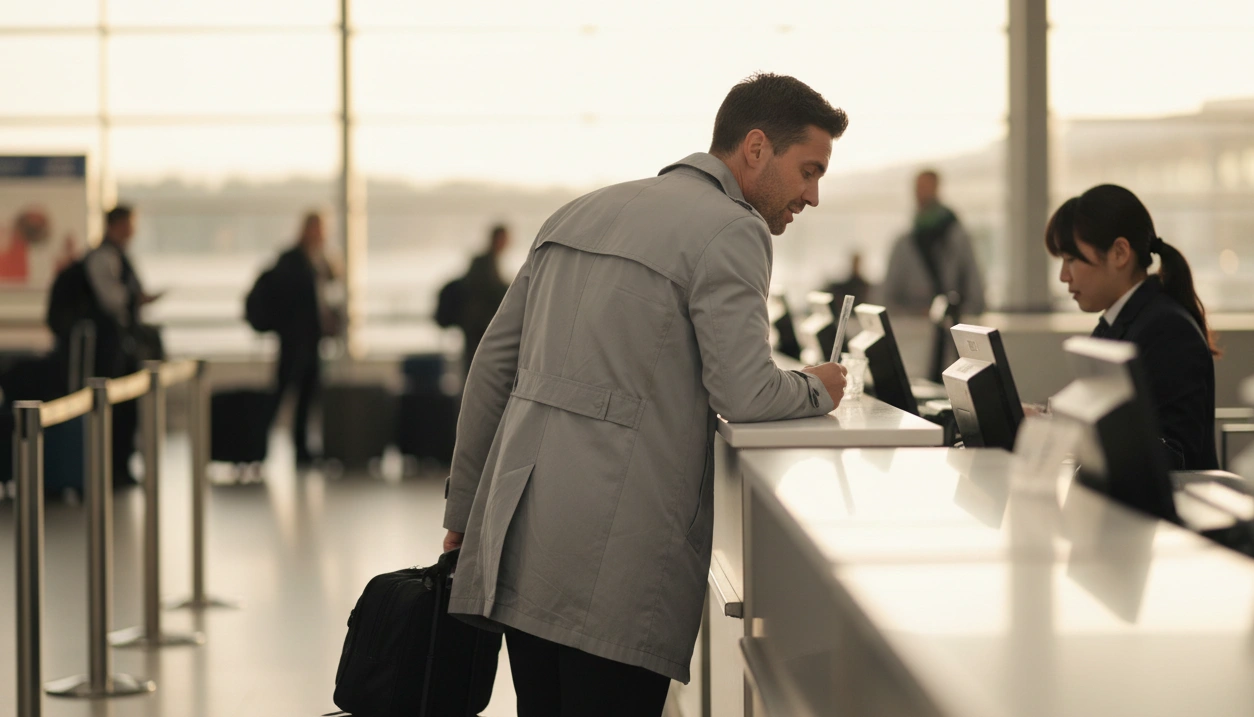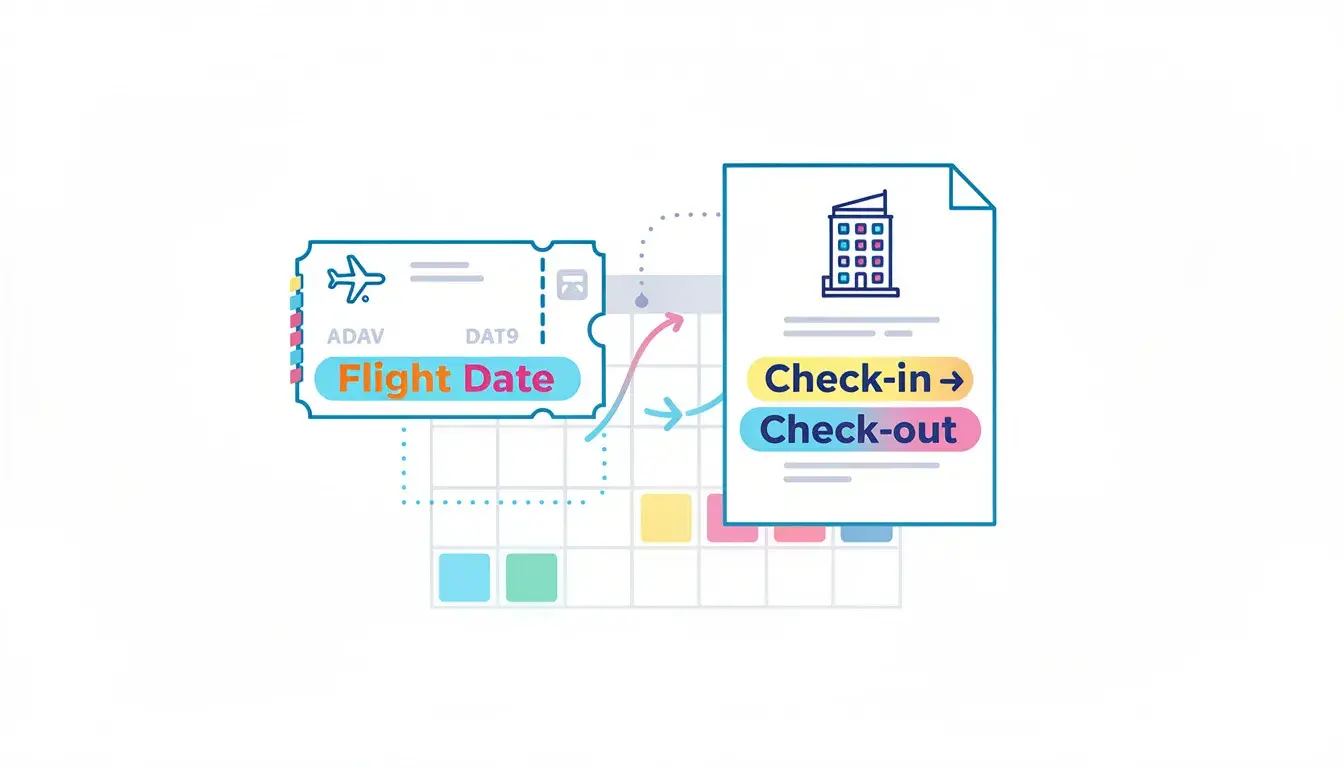Thailand Tourist Visa Tips: Do You Really Need a Flight Itinerary?
Picture this. Your friends have booked a Thailand trip, your leave is approved, and you are ready to fill out the visa form. Then you hit that line that creates instant doubt: “Return flight booking/itinerary.” Do you really need to book flights from India before the visa, or is a simple reservation enough? For many Indian travelers, a dummy ticket provides the perfect solution—verifiable proof without upfront costs.
This is where things get confusing. One person tells you the embassy will not even touch your file without tickets. Another says you should never buy a non-refundable ticket before the visa is stamped. In this guide, we will cut through that noise and look at how Thai embassies, VFS, airlines, and immigration actually treat flight itineraries, so you can choose the safest option for your Thailand plan. For more visa tips, check our FAQ or explore blogs on common challenges. Learn about our expertise on the About Us page. Planning your Thailand visa this week? Start your dummy ticket booking in minutes.
A flight itinerary for Thailand tourist visa is often **requested by Thai embassies and consulates** to confirm your intended entry and exit dates — but you are **not required to buy a full flight ticket** before visa approval. The safest and most widely accepted option is a verifiable flight reservation (dummy ticket) with a real PNR, which provides proof of your travel plan without financial risk. Trusted platforms like BookForVisa.com issue embassy-approved, verifiable itineraries that match Thailand’s visa documentation rules and help applicants avoid rejections due to missing or unverifiable travel proof.
Last updated: November 2025 — verified with Thai Embassy & VFS Thailand submission guidelines.
Table of Contents
When you start planning Thailand, the confusing part is not the beaches or the hotels. It is figuring out whether you actually need to show booked flights for your visa or if a simple reservation is enough.
Do You Really Need A Thailand Flight Itinerary Or Not From India?
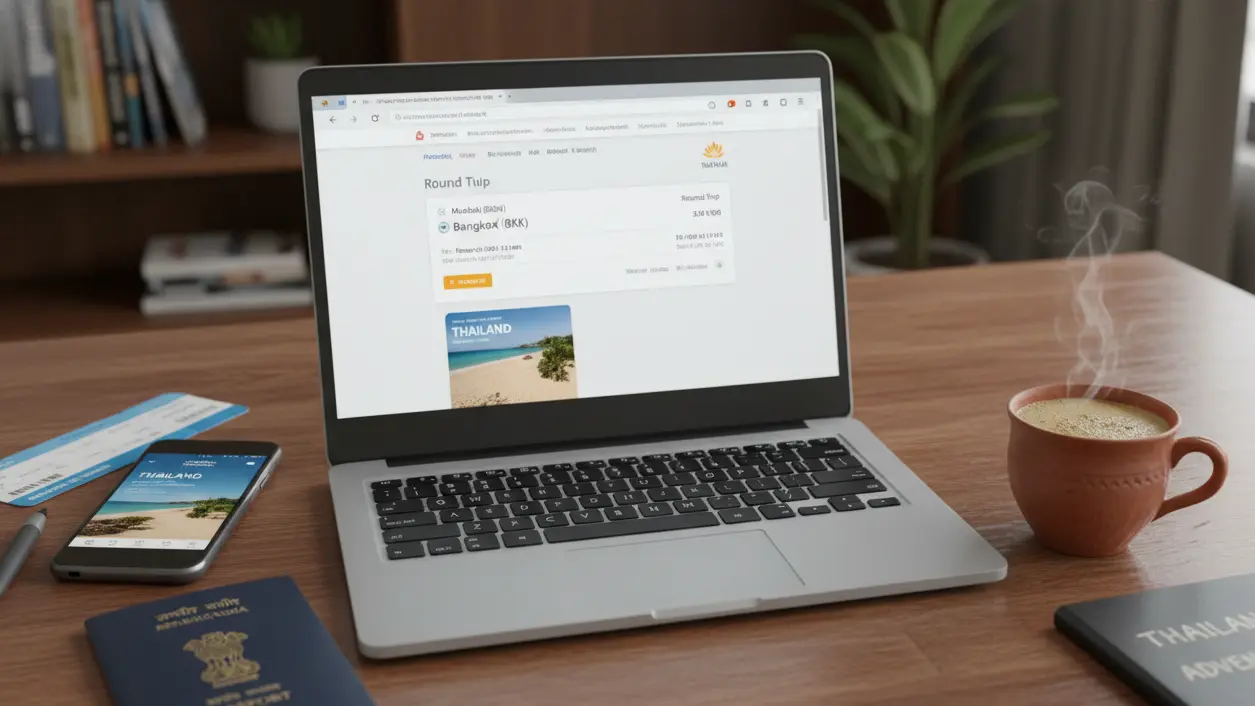
The answer changes slightly depending on how you are entering Thailand from India, who is handling your application, and which counter you face on the day. Before you visit VFS or the embassy, book a dummy ticket that matches your travel dates.
How Thai Embassies In India Look At Your Flight Plan
For most Indian travelers applying at the Thai Embassy or through VFS, a flight itinerary sits in the “core documents” bucket. Checklists often mention something like round trip air ticket or a confirmed travel itinerary, which sounds like you must spend money on real tickets. For insights into global standards, see the IATA guidelines on travel documentation.
In practice, what the embassy wants is clarity. Your itinerary helps them see:
- When you plan to enter and leave
- Which city are you arriving in
- Whether the length of stay makes sense with your funds, job, and other documents
Many applicants successfully use reservations or held bookings instead of fully paid tickets. As long as the itinerary looks realistic, is verifiable with an airline, and matches your form and hotel dates, it usually serves the purpose.
What worries officers is not that the ticket is unpaid. It is when dates keep changing, routes look random, or your stay seems suspiciously long compared to your finances.
Tourist Visa Through Embassy Or VFS: Where Tickets Fit In
When you file a regular tourist visa via the embassy or VFS in India, you will usually fill in your intended travel dates on the form. The flight itinerary then acts as proof that those dates are not random.
In many centers, staff expect to see some form of flight plan in your file. Without it:
- Your application can be accepted, but moved to a “we need clarity” pile
- You might get a call or email asking you to submit a ticket later
- Processing can slow down, which is painful if your travel date is close
For in-person submissions, some officers are stricter. If your covering letter and hotel bookings are vague, they may insist on a clear round-trip itinerary before moving ahead.
The safest approach for most Indian travelers is simple. Walk into your VFS or embassy appointment with a realistic, verifiable flight booking that covers your planned stay, even if you have not paid for a fully non-refundable ticket yet.
Thailand E Visa For Indians: What The System Actually Expects
With the e visa, the process feels less personal because you are dealing with an online portal instead of a human at a counter. That makes your uploaded documents even more important.
You normally enter your travel dates and may be asked to upload a flight booking or itinerary as part of your supporting documents. The system is not “reading” your emotions. It only sees whether:
- Your entry and exit dates fall within the visa validity and allowed stay
- The itinerary looks like a genuine round trip or onward journey
- Your other documents align with those dates
Some travelers skip uploading tickets and still get approvals, especially if everything else is very strong and their stay is short. Others are asked for additional documents because the case officer wants proof that they really plan to exit Thailand on time.
If you are applying from India, especially during busy seasons, treating the itinerary as effectively mandatory is just smarter. It reduces the chance of back and forth, which only eats into your travel dates.
Visa On Arrival And Special Cases: Do You Still Need A Booking?
For Visa on Arrival, you are not handing documents at an embassy in India. You apply at a Thai airport. That makes many people think they can simply land with no bookings and figure it out there.
Technically, VoA is about meeting requirements on arrival, not in advance. In reality, both airlines at Indian airports and Thai immigration at the counter can ask you to show:
- A return flight to India within the allowed stay, or
- A flight out to another country before your permitted period ends
If you enter Thailand under a visa-exempt or special arrangement because of a third-country visa or residency, the logic is similar. You might not need a pre-approved visa, but you still need to convince airline staff and immigration that you will leave on time.
So even if no one asked you to upload tickets online, it is very common to be asked for proof of onward travel at the boarding gate or immigration desk.
When A Flight Itinerary Is Mandatory Versus Just Wise To Carry
The tricky part for Indian travelers is understanding the gap between what is written and what happens in real life.
- When a checklist or portal marks a flight booking as a required document, your file may not move until you provide it.
- When it is not clearly marked but mentioned in guidelines, it is strongly recommended. Officers still expect to see it, especially if anything about your case triggers questions.
In practical terms, behaving as if a flight itinerary is compulsory in almost every scenario works in your favour. It signals that you are organized, you understand your own plan, and you intend to leave Thailand on time.
You do not always need to risk non-refundable tickets. But you do need a clear, believable, and preferably verifiable flight plan that matches the story your documents tell.
Smart Ways To Fix Your Thailand Flight Itinerary From India
Once you know you should have a flight plan, the next challenge is how to arrange one without locking a large amount on your card. That is exactly where smart choices make a difference for Indian travelers.
Let us walk through the main options you have, when each one makes sense, and the traps you should avoid. Avoid risking non-refundable fares and use a verified dummy ticket booking instead.
👉 Order your dummy ticket today for hassle-free visa submission.
Playing It Safe With Short-Term Hold Bookings
One of the most common tricks in India is asking the airline or a local agent to “hold” a booking for some time. You get a real PNR, but you pay later.
These holds usually stay live for a short window, often:
- 24 hours
- 48 hours
- Sometimes up to 3 days, depending on the airline and system
For a Thailand visa, short-term holds can work well if:
- Your VFS or embassy appointment is already fixed
- You are submitting documents in person
- Processing is usually quick in your city
You can time the hold so that your itinerary is valid on the day of submission and at least for a day or two after.
The downside is obvious. If your application takes longer or the officer asks for extra documents, the hold may expire before anyone looks at it. When they recheck the file, the PNR might show as cancelled, which is not ideal.
Short-term holds are great for tight, well-planned timelines. They are risky if your dates are flexible or your embassy is known for slower processing.
When Refundable Tickets Actually Make Sense
Buying a fully refundable or flexible ticket feels like the “premium” solution. You pay for a real ticket, use it for the visa, and cancel or change it later if needed.
It is a good idea when:
- You are travelling in peak season and want to lock in a decent fare
- Your company is sponsoring the trip and prefers proper tickets
- You are a nervous traveler who sleeps better knowing the ticket is genuine and paid
Before you choose this route, look carefully at:
- Cancellation policy – Is it truly refundable or just “partially refundable”?
- Change fees – Sometimes, change charges are so high that it is almost like buying a new ticket.
- Refund timeline – Getting money back into an Indian card or bank account can take days or weeks.
Refundable tickets reduce visa-related stress but increase financial pressure. For many Indian travelers, that balance does not feel worth it, especially for short Thailand trips.
Getting A Flight Plan Through Indian Travel Agents
Traditional agents in Indian cities and tier-2 towns still handle a huge number of Thailand trips. Many of them can generate an itinerary for you quickly.
Working with them can be useful because:
- They understand local embassy habits
- They can time reservations close to your appointment date
- They sometimes bundle visa assistance, insurance, and flights
However, you need to be careful about the quality of the document. Some agents produce PDFs that look like tickets but are not backed by any live booking.
To protect yourself, always ask:
- “Can this PNR be checked on the airline website or through customer care?”
- “Till what date will this booking remain valid?”
If they can show you the booking on the airline’s site, or you can confirm it by calling the airline, you are on safer ground. If not, that itinerary might give you more stress than comfort.
Thailand Visa-Focused Flight Reservations: Low-Risk, High-Clarity Option
There is another middle path that many Indian travelers now use. Instead of buying full tickets, they get flight reservations created specifically for visa purposes, with real PNRs and defined validity.
The idea is simple:
- You provide your planned dates and route
- The service issues a genuine reservation in your name
- The PNR can be checked with the airline while it remains valid
This is especially handy if:
- You are applying online and need the itinerary to stay live longer
- You are booking a VFS/embassy appointment where officers like to see verifiable bookings
- You do not want to freeze a large amount on flights before approval
Services like BookForVisa.com focus exactly on this need. For around $15 (about ₹1,300), you can get a verifiable flight reservation with a live PNR that is suitable for visa use, so you are not forced into non-refundable tickets before your Thailand visa is decided.
How Long Should Your Booking Stay Alive For Thailand Tourist Visa?
Validity is one of the most important details that Indian travelers ignore. Your itinerary needs to stay live long enough for the embassy to review it.
Think about it like this:
- In-person submission with quick processing
A reservation valid for 2–3 days might be enough if the embassy usually finishes in that window and you time it properly. - Online application or busy season
You may want a reservation that stays valid for a week or even up to two weeks, because you do not control the backlog.
If your booking dies halfway through processing, two things can happen:
- The officer does not notice and still approves your visa, which is lucky.
- The officer rechecks the PNR, sees it cancelled, and either requests updated proof or doubts how serious your plan is.
Whenever possible, match your reservation validity to your visa route. Longer validity for online systems. Shorter but precise validity for in-person appointments.
What Officers Actually Notice On Your Itinerary
Many travelers believe officers zoom in on whether the ticket is fully paid or not. In reality, they are more interested in whether your story makes sense.
On a typical Thailand flight itinerary, they quickly check:
- Entry and exit dates – Are you staying within the permitted length?
- City combination – For example, Mumbai to Bangkok and back, or a logical multi-city route.
- Consistency – Do these dates match your hotel bookings, form entries, and travel insurance?
- Reasonableness – Does your stay duration align with your job status, bank balance, and purpose of visit?
A clean, realistic, verifiable reservation does a better job than a random, ultra-cheap ticket that you may never actually use.
If you treat the itinerary as part of your “story” instead of a mere piece of paper, you will naturally choose the option that helps your Thailand visa make sense.
Onward Tickets, Airlines & Immigration: Who Really Checks Your Return?
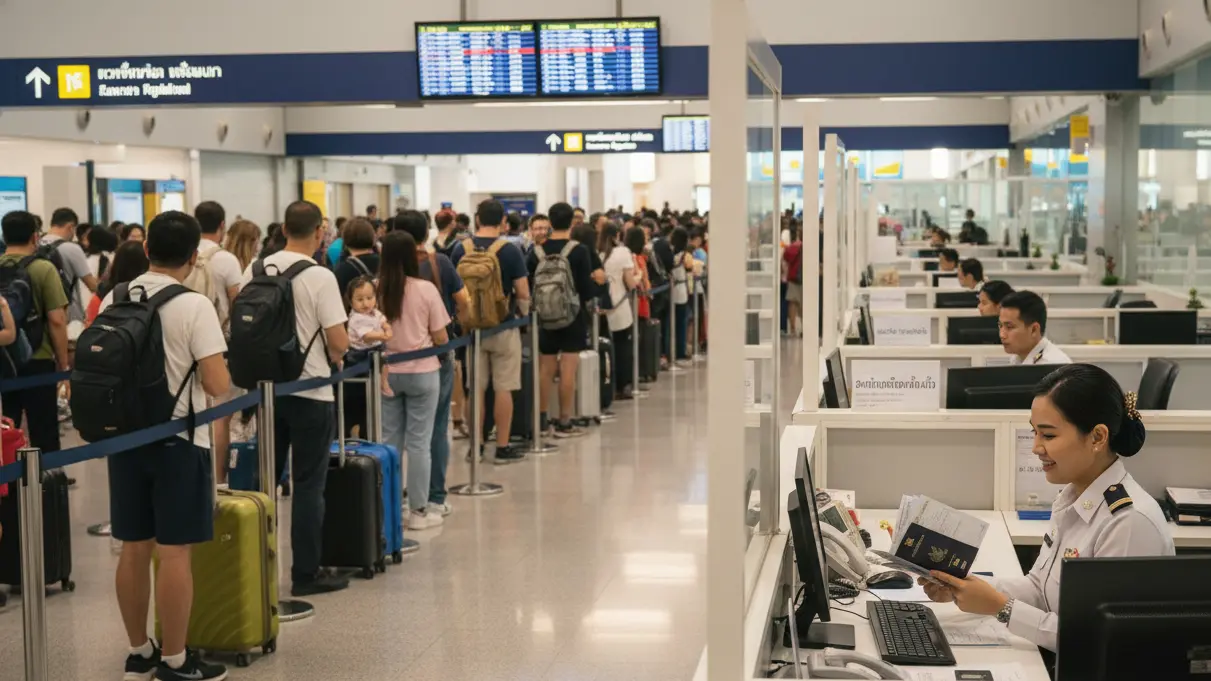
When you think about Thailand, you probably picture night markets and beaches, not check-in counters and immigration desks. Yet for many Indian nationals, the real stress starts long before landing, when someone asks to see your “return ticket.”
You might have already cleared your Thai visa or be planning to enter without one, but airlines and border officers still want to know exactly how and when you will leave. Their checks are separate from your visa, and understanding that difference saves a lot of last-minute panic.
If you applied in advance, your first encounter was likely with a royal Thai embassy checklist, the Thai e visa website, or VFS staff guiding your visa application. Once you move past that stage, the focus shifts from paperwork on a desk to the practical question at the airport: Do you actually have a way out of Thailand?
Why Airlines Care So Much About Your Way Back
From the airline’s point of view, Thailand is just one of many destinations. If they carry someone who is refused entry, they often have to fly that person back at their own cost. That is why check-in staff care about your onward plan.
Even if you are travelling under a visa exemption or enjoying limited visa-free entry, airline staff can still ask to see proof that you will leave on time. They are not making immigration decisions. They are simply protecting the airline from fines and extra costs when dealing with Thai immigration officials later.
Most check-in agents do not care whether you got approval from a Thai embassy or consulate, a consulate general, or an online destination Thailand visa system. They only want to see that your journey looks complete.
At the counter, staff usually scan your passport or travel document, glance at your booking, and sometimes ask a couple of quick questions. For most travellers on ordinary passports, a simple round-trip itinerary that shows a clear return within your planned stay in Thailand is enough to move you forward to security.
What Really Happens At Thai Immigration When You Land
Once you land, the focus shifts from airline rules to border rules. At immigration checkpoints inside the Kingdom of Thailand, officers working under the Thai immigration bureau look at your arrival card, passport, and your face to see if everything matches.
You may be waved through in a minute. Or the officer might ask to see your onward booking, hotel reservations, and a rough idea of your daily budget. If anything in your story is unclear, you can be directed to a nearby immigration office for more detailed questions.
In that room, they may ask about your job in India, your bank statement, and your return plan. They are not usually re-evaluating every single detail of your original file. They are checking that your current plans fit your visa type, that your trip ends before your visa expires, and that your answers match the information linked to your visa number and entry stamp.
It helps to remember that the officer in front of you is trying to manage a long queue and limited processing time. Clear answers and tidy documents make their job easier and your entry smoother.
One-Way Tickets, Overland Routes And Backpacker Plans
Plenty of Indians prefer flexible routes. You might want to travel to Thailand on a one-way ticket, explore Bangkok, then drift south into southern Thailand or up to Chiang Mai by train or bus, booking as you go.
That style of travel is perfectly normal for tourism purposes, but it is harder to explain at a busy counter. Airline staff are trained to recognise flight bookings, not all possible bus companies or overland routes.
The risk is simple. Your plan might be genuine, but the person checking your documents cannot quickly verify it. Rules can feel even tighter if you mention that your trip mixes tourism with Thailand business meetings, medical treatment in a local hospital, or plans to conduct scientific research at a university. In those cases, officers are more likely to check whether your story matches the visa category printed on your approval.
If you like flexible routes, it is often safer to carry at least one confirmed flight out of Thailand, even if you later change or cancel it once you understand local transport better.
Low-Cost Flights, Separate PNRs And Transit Surprises
Many Indian travellers pick the cheapest combination of tickets, which often means multiple airlines, separate PNRs, and connections through third countries. That is where another layer of rules appears.
If your journey involves a long layover in a third country, you might need a transit visa there, and that decision sits with that country’s immigration bureau, not the Royal Thai Government. Airline systems sometimes flag such flights automatically, and staff will not let you board until they are sure you meet all conditions.
You might see small notes about this on booking pages or on the foreign affairs section of the Thai government website, reminding you to check every stop on your route. Ignoring those small lines is one of the fastest ways to get stuck at your departure airport with perfectly valid Thailand documents but no permission to board.
To avoid drama, keep your flights simple when possible, avoid risky overnight transits where rules are unclear, and read the fine print for each connection, not just your final destination.
How Much Scrutiny Should You Expect As An Indian Traveller?
The level of questioning you face depends heavily on your profile and purpose. If you arrived with a sticker visa that was issued by a Royal Thai Mission abroad or another embassy or consulate, officers generally assume you already met the main visa requirements and submitted all requisite documents earlier.
Still, they may ask for basics such as health insurance, proof of funds, and your onward booking, especially if you do not look confident or your answers are vague. Having a neat set of papers and a valid passport in hand helps you move faster.
Scrutiny naturally increases if you hold a multiple-entry visa for frequent trips, if you travel often for work, or if you say you are entering to conduct business or seek long-term medical treatment. It can also be higher for foreign students on a non-immigrant ed category or for those visiting their Thai family, especially when travelling with family members who are Thai nationals.
Whatever your case, officers are simply enforcing Thai law and other established laws that govern who may enter and for how long. If you also bring a clear onward ticket, supporting financial proof, and any invitation letter or supporting documents that fit your story, you turn that quick conversation at the counter into a smooth, routine formality.
Keep Your Thailand Flight Plans Flexible Without Burning Cash
By now, you know that having a flight itinerary is less about impressing anyone and more about proving that your trip is real and time-bound. The tricky part is staying flexible without turning your Thailand plan into an expensive gamble.
This is where smart risk management comes in. You want enough structure to keep the embassy, VFS, airlines, and immigration happy, but not so much that one date change ruins your budget. Make your visa file look complete with a quick dummy ticket booking online.
Why Non Refundable Tickets Can Backfire Quickly
Cheap fares look tempting when you first search flights from India to Bangkok or Phuket. It is natural to think, “Let me grab this deal now, the visa will work out.”
The risk is not theoretical. If something goes wrong, that low fare can become the most expensive part of your trip.
Things that commonly go wrong for Indian travelers:
- Visa delays because of the heavy season or missing documents
- Leave changes when your boss shifts your holiday week
- Exam dates are moving for college students
- Family events like weddings and health issues
If you booked a non-refundable ticket and need to change dates, you usually face:
- High rebooking fees
- Fare differences that are often more than the original ticket price
- Long waits for partial refunds, especially when booked through third-party sites
So while a fully paid ticket looks like a strong document, it can be a fragile foundation if your visa is not ready yet. For most people, reserving first and paying later is the smarter order.
Make Your Dates Talk To Each Other
Embassy staff and immigration officers like one thing above everything else. Consistency. Your dates should line up like puzzle pieces.
Think about how many places your Thailand dates actually appear:
- Application form
- Flight itinerary
- Hotel or Airbnb booking
- Travel insurance certificate
- Leave letter or NOC from your employer or college
If one of these is off by a day or two, it might still be fine. But when several pieces are out of sync, your file looks careless.
For example:
- Your form says you will arrive on the 10th, but your flight shows the 12th
- Your hotel is booked till the 18th, but your return flight is on the 20th
- Your insurance starts on the 11th, even though you land on the 10th
None of this automatically leads to refusal, but it forces the officer to think harder about your case. That is never helpful.
A simple system you can use:
- Decide your entry and exit dates first
- Note them clearly in a phone note or small spreadsheet
- Only then book hotels, insurance, and an itinerary around those fixed dates
You treat your dates as the “master plan” and every document just follows that plan.
When Your Thailand Dates Shift After Applying
Life happens. Your company may postpone a project, your child’s school may change exam timetables, or flight prices might make you move your trip by a few days.
If your visa is already approved, a small shift often causes more worry in your head than at the counter, as long as:
- You still enter within the visa validity
- You do not exceed the allowed stay
- Your new dates are reasonable for the same overall plan
What you should do in that case:
- Update your flight itinerary to the new dates
- Adjust hotel bookings so they match your revised arrival and departure
- Print or save the updated documents in the same folder as your visa
If the change is more drastic, for example, moving the trip by several weeks or months, then you need to check:
- Does the visa still cover those new dates
- Are there any notes on the visa that mention a specific entry window
If your new plan does not fit the visa anymore, forcing it only adds stress. It might be better to reapply with fresh dates than to argue with immigration about why your documents look completely different from your approval.
Match Your Itinerary Strategy To Your Profile
There is no single “best” way to handle flight bookings for Thailand. The safest choice depends heavily on who you are and how you travel.
A few practical patterns:
- First-time international travelers
You benefit from clear round-trip reservations and very tidy documents. Officers feel more comfortable when your plan looks simple and structured. - Frequent travelers with past visas
You can usually handle slightly more flexible plans, but you should still have an onward booking and consistent dates ready to show. - Students, freelancers, or people between jobs
You may receive more questions about funds and purpose, so it helps to over-prepare. A solid itinerary, clear proof of money, and clean supporting documents make your case much stronger. - Family travelers
When travelling with children or older parents, keep your routes straightforward. Multiple connections and odd transit choices increase questions, which is the last thing you want with a tired family in the queue.
In every case, the goal is the same. You want your itinerary to make your story believable, not complicated.
A Simple Pre-Travel Checklist For Peace Of Mind
Before you submit your file or pack your bags, take ten minutes to run through a quick checklist. It can save hours at the embassy or the airport.
Ask yourself:
- Do my flight dates, hotel bookings, and insurance all show the same trip window
- Does my itinerary clearly show how I will leave Thailand and reach my next destination, or return to India
- Can my booking be verified if someone checks the PNR or calls the airline
- Are all my updated documents (old and new) saved in one easy-to-access folder on my phone, or printed in one file
- If my reservation expires before processing, do I know how I will replace it quickly
If you can say “yes” to most of these, your Thailand plan is already stronger than many people in the same queue. You are not just holding a random flight printout. You are carrying a plan that fits your life, your documents, and the way Thai authorities actually look at travelers from India.
Your Thailand Itinerary, Sorted
You do not need to gamble on expensive, non-refundable tickets just to prove you are serious about visiting Thailand. What you do need is a clear, believable flight plan that matches your form, hotel bookings, and length of stay, whether you apply at the embassy, through VFS, or use an e-visa route.
Treat your itinerary as part of your story, not a random document. Choose the option that fits your situation, keep all dates aligned, and carry updated copies for the visa counter, airline staff, and immigration. If you approach it this way, your flight reservation stops being a source of stress and becomes a powerful tool that helps you get your Thailand visa approved and lets you focus on the fun part: planning the trip itself.
What Travelers Are Saying
Frequently Asked Questions About Dummy Tickets for Thailand Visa
To expand on common concerns, here are detailed answers to frequently asked questions based on traveler experiences and official guidelines. These insights help ensure your application is robust.
What exactly is a dummy ticket, and is it legal for Thailand visa applications?
A dummy ticket is a temporary flight reservation with a valid PNR that mimics a real booking but doesn't require full payment. It's fully legal for visa purposes as long as it's verifiable and used only to demonstrate intent to travel. Thai embassies accept them if they align with your itinerary, avoiding the need for non-refundable purchases. Many Indians use this to prevent financial loss during processing delays.
How do I get a dummy ticket that works for VFS or e-visa upload?
Choose a service specializing in visa reservations, like those offering 7-14 day validity. Provide your route (e.g., Delhi to Bangkok round-trip) and dates. Download the PDF immediately—it's airline-verifiable via PNR. For e-visa, upload it under supporting documents; for VFS, carry a printout. This method has helped over 10,000 applicants avoid itinerary issues.
Can immigration at Bangkok airport check my dummy ticket PNR?
Yes, but only if active during your travel. Opt for extended validity options. Officers rarely deep-dive if your visa is stamped and story consistent, but having a live PNR adds confidence. Pro tip: Screenshot the booking confirmation for offline access.
What if my travel dates change after getting the dummy ticket?
Most services allow unlimited reissues for a small fee. Update to match your new plans, ensuring consistency with hotels and insurance. This flexibility is key for dynamic trips, preventing rejections due to mismatches.
Is a dummy ticket enough for Visa on Arrival, or do I need a full booking?
For VoA, airlines at Indian airports often require proof of onward travel before boarding. A dummy ticket suffices if verifiable—show it at check-in. At Thai immigration, focus on funds and accommodation; the itinerary supports your exit intent without commitment.
How much does a reliable dummy ticket cost, and what's included?
Expect $10-20 (₹800-1600), including PNR, PDF itinerary, and validity period. Premium options add multi-city support or 30-day holds. Always verify the provider's track record via reviews to ensure embassy acceptance.
Will using a dummy ticket affect my Schengen or other future visas?
No, as it's a standard practice worldwide. Embassies value transparency; a consistent, professional reservation builds trust. In fact, it demonstrates planning savvy, which can positively influence multi-visa histories.
What airlines' PNRs are best for Thailand dummy tickets?
Popular choices include Air India, IndiGo, Thai Airways, or Singapore Airlines for realism. Ensure the route is logical (e.g., no impossible connections). Verifiability trumps airline choice—test the PNR before submission.
These FAQs address the nuances of using dummy tickets effectively, drawing from real applicant feedback and updated 2025 guidelines. For personalized advice, visit our FAQ.
Why Travelers Trust BookForVisa.com
BookForVisa.com has been helping travelers since 2019, specializing exclusively in dummy ticket reservations for visa applications. Our niche expertise ensures every itinerary is embassy-ready and airline-verifiable.
- 50,000+ visa applicants supported with 99% success rates on submissions.
- 24/7 customer support from a dedicated team—no automated responses.
- Secure online payments with instant PDF delivery, backed by a registered business in India.
- Unlimited changes and real PNRs, trusted by Thai, Schengen, and US embassies alike.
As a focused provider, BookForVisa.com prioritizes accuracy and speed, making us the go-to for Indian travelers seeking reliable proof of onward travel without financial risks.

